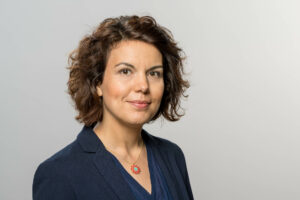Biography
Danny Nedialkova studied biotechnology at the University of Perugia (Italy) from 2001 to 2004 and received her doctorate in molecular virology from Leiden University (The Netherlands) in 2010. She later worked as a postdoc at the Max Planck Institute for Molecular Biomedicine in Münster, with a long-term fellowship from the European Molecular Biology Organization.
Since 2017, she leads the Max Planck Research Group “Mechanisms of Protein Biogenesis” at the MPI of Biochemistry in Martinsried. That same year, she was appointed as a Tenure-Track Professor for Biochemistry of Gene Expression at the Department of Chemistry (TU Munich) through the MaxPlanck@TUM program.
Education and positions held
- 2017 – present:
- Max Planck Research Group Leader (MPI of Biochemistry, Martinsried, DE)
- 2017 – present:
- Tenure-track Professor (Department of Chemistry, TU Munich, DE)
- 2010 – 2016:
- Postdoctoral Fellow (MPI of Molecular Biomedicine, Münster, DE)
- 2004 – 2010:
- Ph.D Student (Leiden University Medical Center, NL)
- 2001 – 2004:
- B.Sc Student (Universita degli Studi di Perugia, IT)
Research Summary
Proteins mediate most biological processes and function only after folding into complex three-dimensional shapes. To ensure protein homeostasis in a range of environments, cells rely on a complex molecular network that orchestrates timely and accurate protein synthesis, folding, and degradation.
Our research seeks to define how distinct metazoan cell proteomes are established and maintained, and to uncover why some cell types are selectively vulnerable to proteome damage. We address these questions at a systems level using genome-wide assays and gene inactivation screens in stem cell-derived models.
Key publications
- Behrens, A., Rodschinka, G., Nedialkova D.D. 2021. “High-resolution quantitative profiling of tRNA abundance and modification status in eukaryotes by mim-tRNAseq”. Molecular Cell 81(8):1802-1815.e7.
- Jungfleisch J., Nedialkova D.D.*, Dotu I.*, Sloan K.E., Bruening L., Raineri E., Bohnsack M., Leidel S.A., Diez J. 2017. “A novel and conserved translational control mechanism involving RNA structures within coding sequences“. Genome Res.; 27(1):95-106.*Equal contribution
- Laguesse S.*, Creppe C.*, Nedialkova D.D., Prévot P.-P., Borgs L., Huysseune S., Franco B., Duysens G., Krusy N., Lee G., Thelen N., Thiry M., Close P., Chariot A., Malgrange B., Leidel S.A., Godin J.D., Nguyen L. 2015. “A dynamic unfolded protein response contributes to the control of cortical neurogenesis”. Dev Cell 35 (5): 553-67 *Equal contribution
- Nedialkova D.D., Leidel S.A. 2015. “Optimization of codon translation rates via tRNA modifications maintains proteome integrity”. Cell 161 (7): 1606-1618.
- Nedialkova D.D., Gorbalenya A.E., Snijder E.J. 2010. “Arterivirus nsp1 modulates the accumulation of minus-strand templates to control the relative abundance of viral mRNAs”. PLoS Pathog. 6(2): e1000772.
- Nedialkova D.D., Ulferts R., van den Born E., Lauber C., Gorbalenya A.E., Ziebuhr J., Snijder E.J. 2009. “Biochemical characterization of arterivirus nonstructural protein 11 reveals the nidovirus-wide conservation of a replicative endoribonuclease”. J Virol. 83 (11): 5671–5682.

